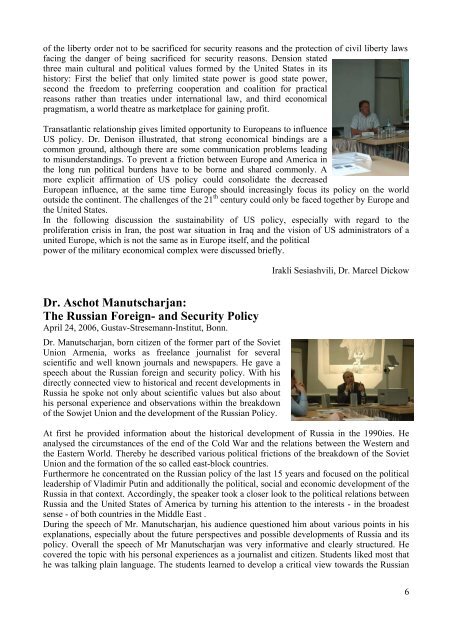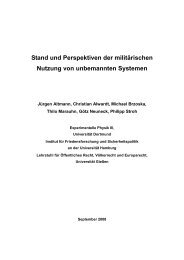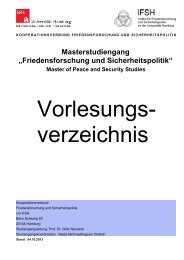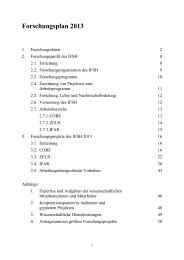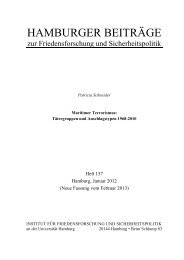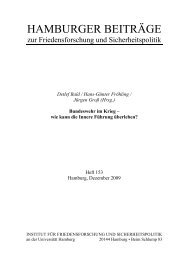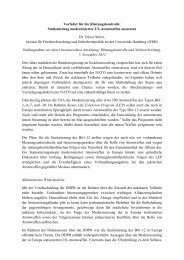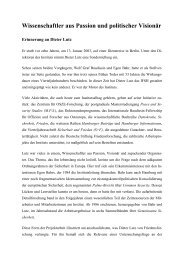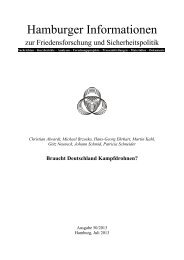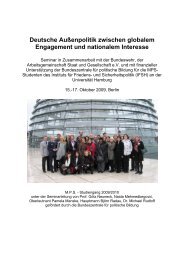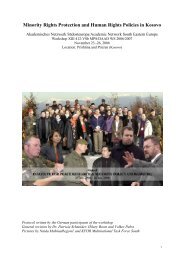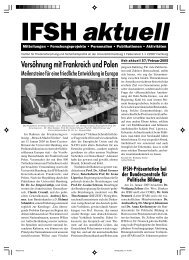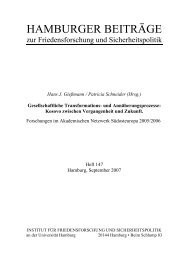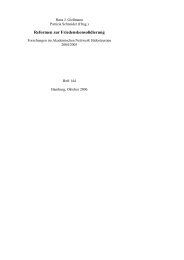New Challenges for the German Security Policy - IFSH
New Challenges for the German Security Policy - IFSH
New Challenges for the German Security Policy - IFSH
Create successful ePaper yourself
Turn your PDF publications into a flip-book with our unique Google optimized e-Paper software.
of <strong>the</strong> liberty order not to be sacrificed <strong>for</strong> security reasons and <strong>the</strong> protection of civil liberty laws<br />
facing <strong>the</strong> danger of being sacrificed <strong>for</strong> security reasons. Dension stated<br />
three main cultural and political values <strong>for</strong>med by <strong>the</strong> United States in its<br />
history: First <strong>the</strong> belief that only limited state power is good state power,<br />
second <strong>the</strong> freedom to preferring cooperation and coalition <strong>for</strong> practical<br />
reasons ra<strong>the</strong>r than treaties under international law, and third economical<br />
pragmatism, a world <strong>the</strong>atre as marketplace <strong>for</strong> gaining profit.<br />
Transatlantic relationship gives limited opportunity to Europeans to influence<br />
US policy. Dr. Denison illustrated, that strong economical bindings are a<br />
common ground, although <strong>the</strong>re are some communication problems leading<br />
to misunderstandings. To prevent a friction between Europe and America in<br />
<strong>the</strong> long run political burdens have to be borne and shared commonly. A<br />
more explicit affirmation of US policy could consolidate <strong>the</strong> decreased<br />
European influence, at <strong>the</strong> same time Europe should increasingly focus its policy on <strong>the</strong> world<br />
outside <strong>the</strong> continent. The challenges of <strong>the</strong> 21 th century could only be faced toge<strong>the</strong>r by Europe and<br />
<strong>the</strong> United States.<br />
In <strong>the</strong> following discussion <strong>the</strong> sustainability of US policy, especially with regard to <strong>the</strong><br />
proliferation crisis in Iran, <strong>the</strong> post war situation in Iraq and <strong>the</strong> vision of US administrators of a<br />
united Europe, which is not <strong>the</strong> same as in Europe itself, and <strong>the</strong> political<br />
power of <strong>the</strong> military economical complex were discussed briefly.<br />
Dr. Aschot Manutscharjan:<br />
The Russian Foreign- and <strong>Security</strong> <strong>Policy</strong><br />
April 24, 2006, Gustav-Stresemann-Institut, Bonn.<br />
Dr. Manutscharjan, born citizen of <strong>the</strong> <strong>for</strong>mer part of <strong>the</strong> Soviet<br />
Union Armenia, works as freelance journalist <strong>for</strong> several<br />
scientific and well known journals and newspapers. He gave a<br />
speech about <strong>the</strong> Russian <strong>for</strong>eign and security policy. With his<br />
directly connected view to historical and recent developments in<br />
Russia he spoke not only about scientific values but also about<br />
his personal experience and observations within <strong>the</strong> breakdown<br />
of <strong>the</strong> Sowjet Union and <strong>the</strong> development of <strong>the</strong> Russian <strong>Policy</strong>.<br />
Irakli Sesiashvili, Dr. Marcel Dickow<br />
At first he provided in<strong>for</strong>mation about <strong>the</strong> historical development of Russia in <strong>the</strong> 1990ies. He<br />
analysed <strong>the</strong> circumstances of <strong>the</strong> end of <strong>the</strong> Cold War and <strong>the</strong> relations between <strong>the</strong> Western and<br />
<strong>the</strong> Eastern World. Thereby he described various political frictions of <strong>the</strong> breakdown of <strong>the</strong> Soviet<br />
Union and <strong>the</strong> <strong>for</strong>mation of <strong>the</strong> so called east-block countries.<br />
Fur<strong>the</strong>rmore he concentrated on <strong>the</strong> Russian policy of <strong>the</strong> last 15 years and focused on <strong>the</strong> political<br />
leadership of Vladimir Putin and additionally <strong>the</strong> political, social and economic development of <strong>the</strong><br />
Russia in that context. Accordingly, <strong>the</strong> speaker took a closer look to <strong>the</strong> political relations between<br />
Russia and <strong>the</strong> United States of America by turning his attention to <strong>the</strong> interests - in <strong>the</strong> broadest<br />
sense - of both countries in <strong>the</strong> Middle East .<br />
During <strong>the</strong> speech of Mr. Manutscharjan, his audience questioned him about various points in his<br />
explanations, especially about <strong>the</strong> future perspectives and possible developments of Russia and its<br />
policy. Overall <strong>the</strong> speech of Mr Manutscharjan was very in<strong>for</strong>mative and clearly structured. He<br />
covered <strong>the</strong> topic with his personal experiences as a journalist and citizen. Students liked most that<br />
he was talking plain language. The students learned to develop a critical view towards <strong>the</strong> Russian<br />
6


